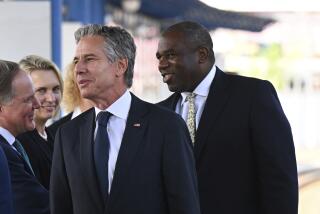Poland to Get Economic Aid From Britain
- Share via
LONDON — Polish leader Wojciech Jaruzelski, fresh from his Communist Party’s stunning electoral defeat, Saturday received a promise of economic aid from Britain and demands by protesters that he resign.
Prime Minister Margaret Thatcher, after a 3 1/2-hour meeting with Jaruzelski, announced measures aimed at encouraging progress toward democracy and reform. The help fell short of Jaruzelski’s hopes for new direct credit lines, sources said.
Solidarity supporters protested the two-day visit outside the Polish Embassy, draping a statue with banners in the red and white colors of the trade union and the Polish flag.
Jaruzelski said in an interview with the British Broadcasting Corp. that last Sunday’s elections, the freest in Poland in four decades, were “a reflection not only of the attitudes but also of the emotions of the Polish people.”
A statement from Thatcher’s 10 Downing St. office said she told Jaruzelski during the meeting at Chequers, the prime minister’s country home, that she welcomes the Communist authorities’ promise to stand by the results.
British aid promised included a $40-million contribution over five years to a new managerial fund to train Poles in “a more market-oriented economy,” the statement said.
Thatcher also said Britain will play a lead role in getting Poland’s $39-billion foreign debt rescheduled by Western creditors. But Britain will encourage new loans only under an International Monetary Fund economic reform program, the statement said.
‘Publicity Stunt’
Outside the Polish Embassy, Tadek Jarski, leader of the British-based movement Solidarity With Solidarity, said Jaruzelski’s visit is a “massive publicity stunt” by the Polish Communist authorities.
“They have lost, and he has no right to come here as a representative of the Polish people,” said Jarski. “If he claims he wants to restore democracy, then his first step must be to resign and have really free elections.”
Jarski compared Jaruzelski to the Communist leaders responsible for crushing the pro-democracy movement in China.
Jarski said that “we have not forgotten” that Jaruzelski imposed martial law in 1981, which led to the banning of Solidarity. It was legalized under an April pact with the government that opened the way for the elections.
In her first meeting with Jaruzelski, in Warsaw in November, 1988, Thatcher had made it clear that Britain would offer no aid to Poland until Solidarity was re-legalized.
Jaruzelski’s visit is aimed at widening contacts with Western governments that have praised the Polish reforms. French President Francois Mitterrand will visit Poland this week, and President Bush will visit Warsaw on July 9-11.
In last Sunday’s elections to Poland’s Senate, Solidarity won 92 seats, with the eight others undecided. Independent candidates were allowed to run for only 161 seats in the 460-seat Sejm, or lower house, and they won 160 seats.
Only two of 35 party candidates who ran opposed received more than 50% of the vote, which was required for them to win their seats.
More to Read
Sign up for Essential California
The most important California stories and recommendations in your inbox every morning.
You may occasionally receive promotional content from the Los Angeles Times.










